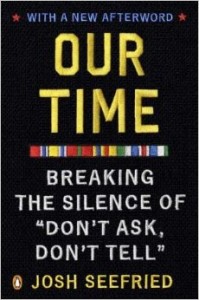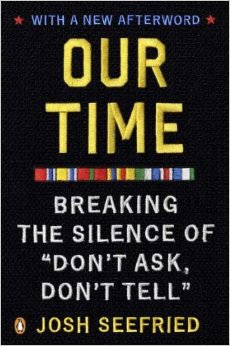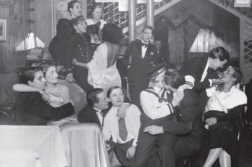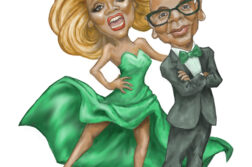 Our Time: Breaking the Silence of “Don’t Ask, Don’t Tell”
Our Time: Breaking the Silence of “Don’t Ask, Don’t Tell”
by Josh Seefried
Penguin Press. 224 pages, $24.95
SOMETIMES, when it got to be too much, Navy sailor Jeffrey Priela retreated to an onboard storage closet. “It was cramped,” he explains in Our Time, “but despite the discomfort, it was a place of solitude and security.” Airman Tim Walker puts the situation more bluntly: “the whole Air Force is a big closet.” Those images of military closets—actual and metaphorical—will haunt readers of Our Time even as they are heartened by the coming-out stories it contains.
Our Time compiles more than fifty first-person narratives, and the most compelling coming-out story is the book’s own. In the months after the repeal of “Don’t ask, don’t tell” on December 22, 2010, a pseudonymous author known only as J. D. Smith gathered these accounts from GLBT servicemembers and veterans. Most were connected to OutServe, an anonymous social networking site for men and women in uniform. Only on September 22, 2011, when DADT was officially no longer in force, could Our Time appear under the name of its actual author, OutServe founder Josh Seefried.
As a collection of coming-out stories, Our Time sounds a familiar refrain: “I felt I was different but struggled to understand why. I feared losing my job. I told my sister and a few close friends. The world didn’t come to an end.” But that familiarity is precisely the point. Our Time helps us to understand the men and women of DADT as real people, deeply human, rather ordinary, and sometimes difficult to fathom. “I came out when I was eighteen and promptly joined the Navy,” one sailor confided. Really? What were you thinking? Well, for this sailor and many like him, as Our Time makes clear, any number of things: I needed a job. I needed to get out of this town. I thought I could handle it. I’m not like other gays. Or perhaps even, I’m not gay at all: “I joined the Navy to prove to myself that I was not gay,” another sailor recalls. (It didn’t work.)
Some of these servicemembers are heroic; others are whiny. A handful are self-loathing, and a few seem arrogant, narcissistic, or self-indulgent—about the same mix you’d find anywhere else. As one sergeant puts it, the Army doesn’t “make anything out of you that you weren’t already.” Still, everyone got tougher to survive DADT—and everyone got hurt along the way. Some of that damage came from the dishonesty of living a double life, conveyed most memorably in Our Time’s account of an Air Force public affairs officer whose job required her to defend DADT to the media. The Defense Department touts its support networks of chaplains, psychological counselors, veterans’ advocates, and military family support programs, but none of them served gay servicemembers. Our Time exposes the human costs of surviving basic training, Afghanistan, and forced silence all by yourself.
This leaves Our Time with one slightly annoying, if unintended, feature. Too often the contributors praise themselves for not being like other gay people. “I don’t look or act like a stereotypical lesbian,” one Air Force officer tells us. “More than a few of my fellow infantrymen knew I was gay,” explains a soldier, “and no one cared.” Years of forced self- reliance have instilled defense mechanisms that led servicemembers to deny the significance of their sexual orientation—and media coverage of the ban only amplified this tendency. In the book’s preface, Representative Patrick Murphy hopes for an army “of soldiers who value their comrades on their performance alone,” and Lori Wilfahrt, whose openly gay son died in service in Afghanistan, explains that “people knew, and nobody cared. … The other part just didn’t matter.” But, of course, it did.
And it does. Woven through Our Time are important reminders of the work that remains. Will openness truly lead to integration? Will gay, lesbian, and bisexual soldiers face a “pink ceiling” barring promotion? What about recognition for servicemembers’ same-sex spouses and their dependents? And where are the apologies for decades of harassment, witch hunts, and more than 14,000 dishonorable discharges since 1993 alone?
Josh Seefried titled his book Our Time because he believes that the answers to those questions should—and now can—emerge from within the ranks: “gay troops must lead.” True enough. But solutions won’t come by insisting that the repeal of DADT doesn’t mark a profound challenge to existing U.S. military culture, or by pretending that soldiers will always be judged by “performance alone,” or by wishing that being gay in the military is about to become “no big deal.” It’s okay for it to be a big deal, because only big deals bring big changes.
Christopher Capozzola is an associate professor of history at MIT.






